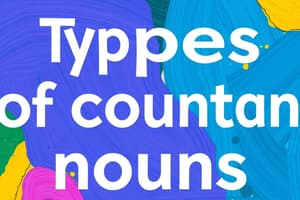Podcast
Questions and Answers
Which of the following is an example of a proper noun?
Which of the following is an example of a proper noun?
- city
- Amazon River (correct)
- ocean
- girl
What type of noun is 'team' when referring to a group of players considered as one unit?
What type of noun is 'team' when referring to a group of players considered as one unit?
- Collective Noun (correct)
- Common Noun
- Abstract Noun
- Concrete Noun
Which of the following is NOT a type of noun?
Which of the following is NOT a type of noun?
- Collective Noun
- Relational Noun (correct)
- Common Noun
- Concrete Noun
Which of the following nouns is a compound noun?
Which of the following nouns is a compound noun?
Which of the following terms describes an idea or a feeling that cannot be physically touched?
Which of the following terms describes an idea or a feeling that cannot be physically touched?
What is the primary difference between common and proper nouns?
What is the primary difference between common and proper nouns?
Which of the following is an example of a collective noun?
Which of the following is an example of a collective noun?
Which of the following is a characteristic of abstract nouns?
Which of the following is a characteristic of abstract nouns?
Which of the following is NOT a linking verb?
Which of the following is NOT a linking verb?
What is the function of auxiliary verbs?
What is the function of auxiliary verbs?
Which verb phrase is correctly identified?
Which verb phrase is correctly identified?
Which of the following sentences uses a helping verb?
Which of the following sentences uses a helping verb?
Why should a strong writer avoid using 'to be' verbs?
Why should a strong writer avoid using 'to be' verbs?
Which of the following is a common helping verb?
Which of the following is a common helping verb?
What is the main verb in the sentence: 'They have been waiting for an hour.'?
What is the main verb in the sentence: 'They have been waiting for an hour.'?
Which sentence correctly demonstrates a verb phrase?
Which sentence correctly demonstrates a verb phrase?
Which sentence correctly uses a transitive verb?
Which sentence correctly uses a transitive verb?
What does a linking verb do in a sentence?
What does a linking verb do in a sentence?
In which of the following sentences is 'swam' used as a transitive verb?
In which of the following sentences is 'swam' used as a transitive verb?
Which sentence demonstrates the use of an intransitive verb?
Which sentence demonstrates the use of an intransitive verb?
Identify the transitive verb in the sentence: 'The teacher read a book to the class.'
Identify the transitive verb in the sentence: 'The teacher read a book to the class.'
Select the sentence that uses 'became' as a linking verb.
Select the sentence that uses 'became' as a linking verb.
Which of the following examples illustrates an action without a direct object?
Which of the following examples illustrates an action without a direct object?
What is the role of a predicate in a sentence?
What is the role of a predicate in a sentence?
What do adverbs primarily modify?
What do adverbs primarily modify?
Which of the following sentences uses an adverb modifying an adjective?
Which of the following sentences uses an adverb modifying an adjective?
In which position can adverbs that modify verbs appear in a sentence?
In which position can adverbs that modify verbs appear in a sentence?
Identify the adverb in the sentence: 'She seldom attends the meetings.'
Identify the adverb in the sentence: 'She seldom attends the meetings.'
What type of adverb is used in the sentence: 'He arrived late to the party.'?
What type of adverb is used in the sentence: 'He arrived late to the party.'?
What does an adverb that illustrates the extent of an action do?
What does an adverb that illustrates the extent of an action do?
Which adverb in the sentence modifies the verb and provides information on when it occurs? 'They will return tomorrow.'
Which adverb in the sentence modifies the verb and provides information on when it occurs? 'They will return tomorrow.'
What is the primary role of adverbs in a sentence?
What is the primary role of adverbs in a sentence?
What is a predicate adjective?
What is a predicate adjective?
Which of the following is an example of a proper adjective?
Which of the following is an example of a proper adjective?
What type of adjective always begins with a capital letter?
What type of adjective always begins with a capital letter?
Which of the following sentences contains a predicate adjective?
Which of the following sentences contains a predicate adjective?
What are articles considered in the context of adjectives?
What are articles considered in the context of adjectives?
What role do adverbs play when modifying adjectives?
What role do adverbs play when modifying adjectives?
In the sentence 'Hannah finished the problem more quickly than Sarah did,' which word is the adverb modifying another adverb?
In the sentence 'Hannah finished the problem more quickly than Sarah did,' which word is the adverb modifying another adverb?
Which type of adjective describes quality or condition?
Which type of adjective describes quality or condition?
What does the phrase 'this book' tell us in terms of adjectives?
What does the phrase 'this book' tell us in terms of adjectives?
Which of the following is NOT a function of adjectives?
Which of the following is NOT a function of adjectives?
From the examples given, which is an example of an adverb that modifies an adjective?
From the examples given, which is an example of an adverb that modifies an adjective?
What is a common characteristic of most adverbs?
What is a common characteristic of most adverbs?
Which option best describes a predicate adjective?
Which option best describes a predicate adjective?
Flashcards
Transitive Verb
Transitive Verb
An action verb that expresses an action directed towards a person or thing.
Intransitive Verb
Intransitive Verb
An action verb that expresses an action without a receiver.
Linking Verb
Linking Verb
A verb that connects the subject to a word that renames or describes it.
Predicate
Predicate
Signup and view all the flashcards
Subject
Subject
Signup and view all the flashcards
Action Verb
Action Verb
Signup and view all the flashcards
Transitive vs. Intransitive
Transitive vs. Intransitive
Signup and view all the flashcards
Complete Sentence
Complete Sentence
Signup and view all the flashcards
Common Noun
Common Noun
Signup and view all the flashcards
Proper Noun
Proper Noun
Signup and view all the flashcards
Collective Noun
Collective Noun
Signup and view all the flashcards
Compound Noun
Compound Noun
Signup and view all the flashcards
Concrete Noun
Concrete Noun
Signup and view all the flashcards
Abstract Noun
Abstract Noun
Signup and view all the flashcards
Pronoun
Pronoun
Signup and view all the flashcards
Verbs
Verbs
Signup and view all the flashcards
To Be Verbs
To Be Verbs
Signup and view all the flashcards
Adverbs Modifying Adjectives
Adverbs Modifying Adjectives
Signup and view all the flashcards
Adverbs Modifying Adverbs
Adverbs Modifying Adverbs
Signup and view all the flashcards
Adjectives
Adjectives
Signup and view all the flashcards
Descriptive Adjectives
Descriptive Adjectives
Signup and view all the flashcards
Predicate Adjectives
Predicate Adjectives
Signup and view all the flashcards
Proper Adjectives
Proper Adjectives
Signup and view all the flashcards
Quantitative Adjectives
Quantitative Adjectives
Signup and view all the flashcards
Demonstrative Adjectives
Demonstrative Adjectives
Signup and view all the flashcards
What are Articles?
What are Articles?
Signup and view all the flashcards
Articles
Articles
Signup and view all the flashcards
Adverb
Adverb
Signup and view all the flashcards
Adverb Placement
Adverb Placement
Signup and view all the flashcards
Adverb Functions
Adverb Functions
Signup and view all the flashcards
Adverb's Role
Adverb's Role
Signup and view all the flashcards
Verb Phrase
Verb Phrase
Signup and view all the flashcards
Adverb Interruption
Adverb Interruption
Signup and view all the flashcards
Study Notes
Parts of Speech: Nouns
- A noun is a person, place, thing, or idea
- There are seven types of nouns
Common Noun
- A general name for a person, place, or thing
- Never capitalized, except at the beginning of a sentence
- Usually preceded by 'a' or 'an'
Proper Noun
- A specific name for a person, place, or thing
- Always capitalized
Collective Noun
- A singular noun that names a group of people or animals
- Can be common or proper
- Examples include Congress, class, herd, family
Compound Noun
- Two or more words used together as a single noun
- Can be written as one word, separate words, or hyphenated words
- Examples include seafood, filmmaker, grasshopper, daydream, footsteps
Concrete Noun
- Names a person, place, or thing that can be seen or touched
- Examples include tiger, lion, telephone, popcorn
Abstract Noun
- Names an idea, feeling, quality, or characteristic
- Cannot be seen or touched
- Examples include knowledge, love, intelligence, ambition, competition, humor
Pronouns
- A word used in place of one or more nouns
- Antecedent is the word or words the pronoun replaces
- Personal pronouns refer to 1st person (the speaker), 2nd person (the listener), or 3rd person (the person or thing discussed)
Pronouns (Continued)
- Two nouns may serve as the antecedent of a pronoun
- Example: Leo and Chris made many flipbooks for their friends.
- Leo and Chris are both antecedents of 'their'.
- Pronouns (Last Rule): When writing narratives, expository, fiction, or non-fiction you MUST use a standard noun first before a pronoun to replace it.
Studying That Suits You
Use AI to generate personalized quizzes and flashcards to suit your learning preferences.




